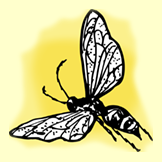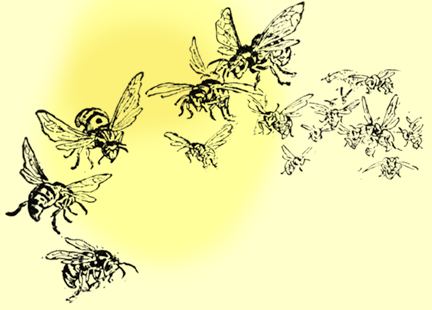Our Mission: The Mattabeseck Audubon Society, a chapter of the National Audubon
Society, is committed to environmental leadership and education for
the benefit of the community and the earth's biodiversity.
deKoven House,
27 Washington Street,
Middletown, Connecticut 06457
WASPS
…But there it is, it’s conscience, and it hurts…
M. Sholokhov
Autumn. The surrounding hills glowed orange and red above the river’s black water dotted with errant multi-hued leaves slowly drifting with the current. At dawn, thick silver mists curled above the river like an old man’s beard until mid-morning when the sun finally opened its eye strongly enough to disperse the moisture in thin ephemeral wisps.
The jet engine combustion test facility rose up grey and unchanged in contrast to the panorama of autumn color. Its 100 foot tall exhaust stack retained the same carbon-streaked complexion year ‘round. The sheet metal buildings that comprised the facility - the high pressure fuel and transfer house, the high pressure water room, the non vitiated air furnace enclosure, the fuel-offloading area and the propane shed - all retained the same bland combination of tan, grey and brown rust regardless of the seasons.
Yet change was nevertheless evident if one was observant. For instance, the tall, muscular Jamison sound protection doors to the test stand where full annular combustors were developed attracted swarms of Lady beetles when the doors were opened during mild, sunny days. The beetles congregated thickly in the crevices of the doors that provided shelter from the night frosts of autumn and a refuge from the approaching deep cold of winter. The wonder was that they could survive huddled together without being summarily crushed by the constant opening and closing of the Jamisons.
 Then there were the ubiquitous wasps. The warm autumn days and cold nights caused them to become frenetic, as if the changing weather acted as a death knell. They inhabited every nook and cranny, buzzed around the edges of the roof tops, occupied every available chasm, hollow pipe and crevice around the test cell exhaust fans and even commandeered the hand rails leading to the tops of the two 30,000 gallon jet fuel tanks.
Then there were the ubiquitous wasps. The warm autumn days and cold nights caused them to become frenetic, as if the changing weather acted as a death knell. They inhabited every nook and cranny, buzzed around the edges of the roof tops, occupied every available chasm, hollow pipe and crevice around the test cell exhaust fans and even commandeered the hand rails leading to the tops of the two 30,000 gallon jet fuel tanks.
The men of the facility cursed the wasps and always ran to the crib to check out poisonous spray cans that could safely zap the insects from several yards away. The men weren’t about to risk getting stung when they did their pre-starts for the test stand on “run day” or did maintenance chores. Everyone felt that way except Walters.
Walters relished Nature and was curious about all its secrets. He regularly explored the second growth woodlot bordering the facility. He knew the names of the trees and shrubs of the understory and what grew where from the ground up. There was Lycopodium and Virginia creeper, spice bush, ironwood, oak, maple and beech. He especially looked forward to spring when the serviceberry was in flower. But there were pests, also: bittersweet vines as thick as a man’s arm crawling up the trunks of trees and Japanese barberry lurking like barbed wire and filled with ticks.
Walters, slim and sinewy, would climb the several flights of metal rungs that led 60 feet to the roof of the test building. He came to observe the river valley in its autumnal blanket and to seek out the wasps.
He had no fear of the striped insects with their large heads and impressive mandibles. He respected but did not fear the posterior protrusion of their insidious stingers. Walters would often go right up to a nest that was hidden in a tube poking out of one of the test cell’s large exhaust fans and curiously watch the behavior of the wasps. There was a method to their madness, he knew. He felt as if the guards to the nest eventually came to recognize his face and would not attack him as long as he didn’t flail about or act out of turn.
It wasn’t always that way. When he was a youngster he and his pals would play around in the town maintenance “bone yard” where concrete storm water pipes were strewn about and an old water wagon truck sat decaying. The cab of the truck was filled with brown, narrow-waisted wasps. Walters, in order to show off in front of his playmates would enter the cab with bravado and crush the wasps with his closed fists, never getting stung. His pals were incredulous.
Walters thought of that massacre now and was ashamed of himself. One always killed what one didn’t understand.
The other men working the test stand thought Walters was crazy. Especially Johnny Large. Johnny was a tormentor of all things flying, walking or crawling. In the spring he would make a show of stomping on starling chicks that had fallen out of nests built into the holes in the corrugated metal siding of the test buildings. “They wouldn’t survive anyway,” he’d cackle with puckered lips and a conspiratorial roll of his faded blue eyes. And then stocky, round-faced Johnny Large would walk away triumphantly.
It was one of those fine autumn days when the sun beamed brightly. The Lady beetles swarmed convivially and the worker wasps flew fiendishly in and out of their nests in obeisance to their queen. A Prax-Air truck pulling a nitrogen trailer behind it had just arrived. The driver backed up behind the test building, set the air brakes and proceeded to disengage the trailer. He went about his routine methodically as if he had done it a thousand times, which he had. Then, brushing a hand over his grey hair, he climbed into his cab and positioned it in line with the empty nitrogen trailer. He climbed out and went around to attach the brake and lighting disconnects to the cab. He suddenly froze like an icicle and worriedly backed away. It was the wasps.

Johnny Large and Gramps, one of the drive engine operators, were standing on the platform outside of the control room watching the exchange of nitrogen trailers. The driver nervously approached them.
“What’s the matter?” Johnny asked, shuffling his feet in anticipation.
“Wasps!” The driver shouted rubbing his his hands over the top of his head. “They’re all over the place! I ain’t goin’ anywhere near ’em! Got anything to kill ’em with?” He shook his head in dread.
Gramps rolled an unlit cigar around in his mouth and chuckled. “Ha, ha, ha!” We thought you saw a ghost. He grabbed the brim of his oily cap and shifted it about.
“Yeah, well, I don’t want to be a ghost,” the driver retorted. “Got anything?” He repeated.
Johnny Large thought a minute then he puckered his small mouth and exposed an upper plate of pink false teeth. “I got something better than spray,” he said slyly. “Plus, we’ll have a show!”
Johnny turned to Gramps. “I’m goin’ to get Walters. He’ll hook up the cab, if anyone can.”
“Ha, ha, ha!” Gramps chortled. His cheeks were filigreed with tiny red veins. “You’re right. Go get him.”
Johnny left and soon returned with Walters in tow.
“What’s up?” Walters asked.
Johnny pointed towards the nitrogen trailer.
The driver asked Walters incredulously, “You want to hitch me up? With those wasps flyin’ around?”
Walters replied, “No problem. Tell me how to do it and I’ll give it a try.”
Having received his instructions Walters approached the trailer and appraised the situation. He stood off to the side of the trailer and the wasps’ flight path and noticed them careening back and forth from a small metal compartment. The ends of the quick disconnects were nearby. He had to carefully grapple with the leads one by one.
Very slowly and deliberately Walters proceeded to connect the leads. The wasps circled around his head, his hands, his face. He moved in a calculated manner, never getting stung.
The last connection made, Walters slowly backed away, looked over at the driver and said, “All yours!”
The driver had a relieved and amazed look on his face. Johnny Large and Gramps exchanged glances.
“Told you,” Johnny said almost reverently. “He’s the wasp man. I would have burned every gob-dum one of ’em!”<
The driver looked over the connections from a respectful distance. Satisfied, he climbed back into his cab and released the air brakes with a loud “shish!” He rolled out of the yard with the empty nitrogen trailer in tow with its metal compartment containing an abandoned queen, the worker wasps left behind still buzzing confusedly in a circle.
Walters stared after the trailer. Wasps still hovered where the trailer and their nest once stood. They were all doomed, coming back from their hunting grounds to a vacuum.
Walters contemplated the part he played in their tragedy.
“But I’m a sentient being, and they aren’t,” he reasoned. “Or are they?”
Undecided, he went back to work.
L.C.
 Then there were the ubiquitous wasps. The warm autumn days and cold nights caused them to become frenetic, as if the changing weather acted as a death knell. They inhabited every nook and cranny, buzzed around the edges of the roof tops, occupied every available chasm, hollow pipe and crevice around the test cell exhaust fans and even commandeered the hand rails leading to the tops of the two 30,000 gallon jet fuel tanks.
Then there were the ubiquitous wasps. The warm autumn days and cold nights caused them to become frenetic, as if the changing weather acted as a death knell. They inhabited every nook and cranny, buzzed around the edges of the roof tops, occupied every available chasm, hollow pipe and crevice around the test cell exhaust fans and even commandeered the hand rails leading to the tops of the two 30,000 gallon jet fuel tanks.